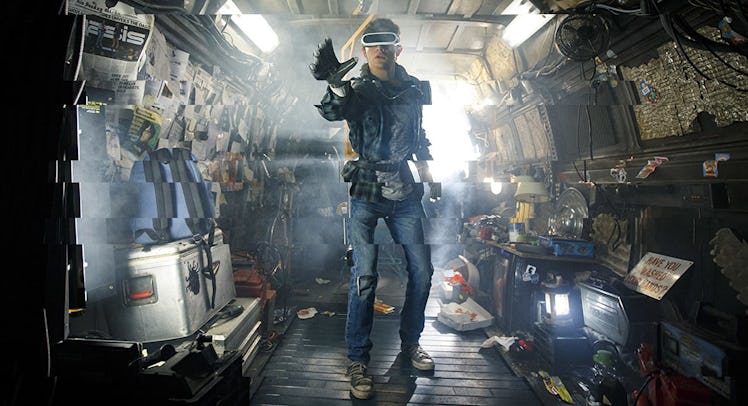‘Ready Player One’ Holds 1980s Kids’ Pop Culture Nostalgia for Ransom
Steven Spielberg's adaptation of a stunningly bad book is, well, stunning, but for all the wrong reasons.

In Steven Spielberg’s Ready Player One, nostalgia isn’t remembering, it’s competing. Never before has a movie so thoroughly weaponized nostalgia: Seemingly every scene in the film adaptation of Ernest Cline’s 2011 book is packed with multiple references to some other, better bit of pop culture from the last 30 years or so. Tracer, from 2016’s massively-successful game Overwatch, lives in the same universe as 1999’s titular The Iron Giant. Cats and dogs live together there as well, sharing Tab while watching Pretty In Pink. Like the book it’s based on, Spielberg’s movie takes for granted that consumers are suckers for nostalgia and builds a buffet. That feeling in the gut after gorging? A mixture of nausea, sentimentality, and fear. Ready Player One ostensibly gives people what they want, but goes out of its way to make it clear who ultimately controls all that IP.
From the race that opens the movie – in which players need to avoid obstacles like the T-Rex from Jurassic Park and bleeping King Kong – to its orgiastic Where’s Waldo in a Blockbuster dumpster climax, the movie never once stops to question whether nostalgia for nostalgia’s sake is a good thing. Instead, it visually brags about how it was able to put Master Chief, of Halo fame, in the same fight scene as all of the Teenage Mutant Ninja Turtles while cranking Twisted Sister’s “We’re Not Gonna Take It.”
The music is especially weird because it never rises above that level of obviousness. The beginning of the film is soundtracked to Van Halen’s “Jump,” with main character Wade Watts literally jumping down a ladder as David Lee Roth hits the titular lyric. The ending, when Wade gets the girl and everything is ok? Hall & Oates’ “You Make My Dreams,” which is somehow more on-the-nose and obnoxious here than when it popped up in the overtly fanciful (500) Days of Summer.
The best part of Ready Player One, the movie, isn’t even in Ready Player One, the book. About halfway through the adaptation, the main characters – Parzival, Art3mis, Aech, Daito, and Sho – are thrust into the Overlook Hotel from The Shining in the search for the second of three keys that will allow them to take control of the virtual-reality OASIS. The search for the keys is the central plot of the movie, based around the 1980s pop culture obsessions of OASIS’s creator James Halliday. The Shining at least feels like an unexpected reference, but also like a threat. Hollywood could reboot that. They own it. They could make a terrifyingly good and goodly terrifying movie suck.
And they kind of do. Without spoiling too much, the iconic blood flood scene is recreated, but in the service of the plot of Ready Player One. It tweaks enough of the formula to not be a shot for shot remake, while simultaneously creating a new set of rules and conditions that explain why it had to be the Overlook Hotel. In other words, it’s very cool. It looks awesome. It’s pleasurable to watch. But it’s also brand synergy and a corruption of authorial intent.
And that’s the most delicate scene in the film — the most respectful treatment of borrowed culture. Before and after that, it’s basically watching someone steal your toys. Gundam fights Mecha-Godzilla while a Chucky doll elicits the film’s only F-bomb from one of his victims. The 1980s battle the 1990s for supremacy over a future devoid of meaning.
Fans of the name-checked movies, TV shows, video games, and music might get an initial thrill from recognizing their favorites up on the screen in 2018, but a sinking suspicion follows. The point that movie seems to be trying to make – that, when given the freedom to be anyone, you choose to be a popular pop culture character – is undercut by how it presents that choice as a net positive. The movie seems to be sincerely questioning its own audience: “Why watch this, when you can just go experience that other thing?” Spielberg inquires. There’s not a clear answer to this question other than this: Because you took that other, better thing I like. Because I came here to see that.
By the time Mortal Kombat’s Goro, already a terrifying character on his own, gets chestbusted by an extraterrestrial from Alien, the audience gets the game. Post-modernism is a double-edged sword. Industry can weaponize even the most innocent of memories. Adults can be sold childhood at a markup.
Don’t worry, though: There’s already a Ready Player Two in the works.
This article was originally published on